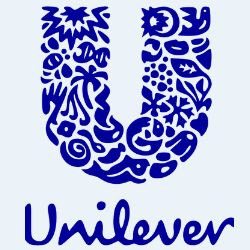Unilever PLC operates in the non-cyclical consumer sector, within the personal and household products industry. The company was founded in 1929 in the United Kingdom and the Netherlands through the merger of Lever Brothers, a British soap manufacturer, and Margarine Unie, a Dutch margarine producer.
Headquartered in London, the company is positioned as one of the world’s largest consumer goods corporations, with operations in more than 190 countries. Unilever’s portfolio includes widely recognized brands across personal care, home care, and food categories, covering segments such as:
Food: Maizena, Kibon, Knorr, Arisco, Lipton, Hellmann’s, Ben & Jerry’s, and Mãe Terra.
Personal Care: Close Up, Comfort, Dove, Lifebuoy, Lux, Rexona, Seda, TreSemmé, Axe, Clear, Vaseline, Simple, and Suave.
Home Care: Cif, Omo, Surf, Vin, Ala, Sun, and Brilhante.
With products available in roughly 25 million points of sale, the company serves markets in North America, Latin America, Europe, Asia, Africa, and Oceania. Its distribution model includes retail chains, supermarkets, pharmacies, and digital channels.
The company’s performance is directly influenced by factors such as consumer trends, sustainability, innovation, and shifts in dietary and hygiene habits. Unilever invests in reducing its carbon footprint, expanding the use of recyclable packaging, and developing products formulated with natural and sustainable ingredients.
Its operational structure includes manufacturing centers, research units, and regional offices, supported by a workforce of approximately 153,000 employees worldwide. The business model is diversified, balancing established brands with strategic acquisitions to expand its footprint across new segments and markets.
Unilever PLC shares trade on the NYSE under the ticker UL and are available in Brazil through the BDR ULEV34.
History and Foundation
Unilever PLC originated in 1929, when Lever Brothers and Margarine Unie merged to form a group focused on producing and marketing consumer goods. The combination brought together expertise in hygiene and food products, creating one of the first modern multinational corporations.
International expansion began in its first year of operation with entry into African and Latin American markets. Over the following decades, the company diversified its portfolio and invested in research and development to adapt to evolving consumer behavior.
Key milestones in Unilever’s evolution include:
1980s: Consolidation as one of the world’s largest corporations and restructuring of its portfolio to prioritize its strongest brands.
1990s and 2000s: Expansion across Central and Eastern Europe, strengthened presence in emerging markets, and strategic acquisitions.
2018: Governance restructuring, consolidating its headquarters in London and ending the dual-structure arrangement with the Netherlands.
2020–2024: Increased focus on sustainability, innovation, and digitalization, alongside growth in segments such as healthy foods and personal care.
Today, Unilever continues to expand its global footprint, investing in sustainable technologies, operational efficiency, and adaptation to new consumer demands, maintaining its position as one of the leading companies in the global consumer goods sector.
Additional Information
The Company Unilever PLC (United States), is listed on NYSE with a market value of $ 159.57 Billions, having an equity of $ 20.59 Billions.
With a total of 153.000 employees, the company is listed in the sector of Consumer/Non-Cyclical and categorized in industry of Personal & Household Prods.
In the last 12 months the Company had a revenue of $ 123.14 Billions, which generated a profit in the amount of $ 17.15 Billions.
As for its main indicators, the Company has a P/E ratio of 9.30, a P/BV ratio of 7.75 and in the last 12 months the dividend yield of UL was at 3.12%.
The Company is traded internationally through the ticker UL.







 Tesla
Tesla





























